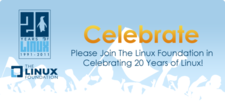Announcements from the 5th Annual Linux Collaboration Summit
The Linux Foundation kicked off the 5th Annual Linux Collaboration Summit with four announcements: the formation of the new High Availability working group, the release of the Carrier Grade Linux 5.0 specification, Yocto Project Release 1.0 availability, and the 20th Anniversary Video Contest.
20th Anniversary of Linux Video Contest was launched and to help inspire people to produce and submit a video, the Linux Foundation kicked off this celebration with the release of "The Story of Linux" video. Linus Torvalds, Linux creator, will choose the best video and the winner of the 20th Anniversary of Linux Video Contest will be announced at LinuxCon in Vancouver. For those who are interested in submitting a video, the submissions should show and celebrate the impact of Linux on computing, business or culture over the last 20 years.
Yocto Project 1.0 was released. The Yocto Project is an open source collaboration project that provides templates, tools and methods to help you create custom Linux-based systems for embedded products regardless of the hardware architecture. More information about the the 1.0 release can be found in the release notes and on the Yocto Project website.
The release of Carrier Grade Linux (CGL) 5.0 specification announced. Since 2001 The Linux Foundation’s CGL workgroup has been collaborating on CGL gaps and requirements, and release of CGL 5.0 covers several specification categories that include Availability, Clustering, Serviceability, Performance, Standards,Hardware, and Security. The Linux Foundation says that currently there are six CGL distributions from major Linux distributors including Novell, MontaVista and Wind River, which are all registered as CGL-compliant.
The full CGL 5.0 specification is available for review on the Linux Foundation Website.
The formation of the new High Availability working group announced. According to the Linux Foundation, the Working Group will bring together projects and stakeholders to collaboratively define the open source HA software stack and prioritize featuresbased on input from developers, vendors, and customers. The projects participating in the forum hosted by The Linux Foundation include: corosync, DRBD, GFS2, hawk, Linux-HA, Linux Virtual Server, luci, OCFS2,Open Clustering Framework, and pacemaker. Enterprise Linux distributions such as as Debian, Fedora, openSUSE, and Ubuntu, are already incorporating this technology and plan to contribute to the working group.
Subscribe to our Linux Newsletters
Find Linux and Open Source Jobs
Subscribe to our ADMIN Newsletters
Support Our Work
Linux Magazine content is made possible with support from readers like you. Please consider contributing when you’ve found an article to be beneficial.

News
-
Canonical Releases Ubuntu 24.04
After a brief pause because of the XZ vulnerability, Ubuntu 24.04 is now available for install.
-
Linux Servers Targeted by Akira Ransomware
A group of bad actors who have already extorted $42 million have their sights set on the Linux platform.
-
TUXEDO Computers Unveils Linux Laptop Featuring AMD Ryzen CPU
This latest release is the first laptop to include the new CPU from Ryzen and Linux preinstalled.
-
XZ Gets the All-Clear
The back door xz vulnerability has been officially reverted for Fedora 40 and versions 38 and 39 were never affected.
-
Canonical Collaborates with Qualcomm on New Venture
This new joint effort is geared toward bringing Ubuntu and Ubuntu Core to Qualcomm-powered devices.
-
Kodi 21.0 Open-Source Entertainment Hub Released
After a year of development, the award-winning Kodi cross-platform, media center software is now available with many new additions and improvements.
-
Linux Usage Increases in Two Key Areas
If market share is your thing, you'll be happy to know that Linux is on the rise in two areas that, if they keep climbing, could have serious meaning for Linux's future.
-
Vulnerability Discovered in xz Libraries
An urgent alert for Fedora 40 has been posted and users should pay attention.
-
Canonical Bumps LTS Support to 12 years
If you're worried that your Ubuntu LTS release won't be supported long enough to last, Canonical has a surprise for you in the form of 12 years of security coverage.
-
Fedora 40 Beta Released Soon
With the official release of Fedora 40 coming in April, it's almost time to download the beta and see what's new.



